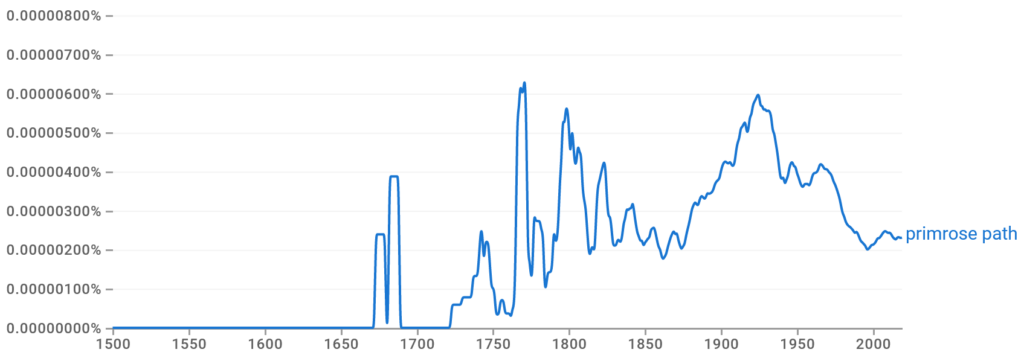Primrose path is an idiom that means a pleasant lifestyle choice that eventually leads to dire consequences. It has been used for the last 400 years in various literary works and is generally used as a warning of sorts.
Idioms such as primrose path are sayings or phrases that mean something different from the actual words used. They’re essential in English because they make our language colorful and interesting. Understanding idioms helps us communicate better and sound more like native speakers.
In this guide, I explore the meaning of the idiom primrose path, uncover its origin, and provide tips on how to use it in speech and writing. I also provide examples of its use and some related terms and phrases. So, keep reading to learn more about this expression, and test your knowledge with a short quiz at the end.

What Does the Idiom Primrose Path Mean?
The idiom primrose path means an easy or pleasurable but ultimately destructive or harmful way of life or behavior. It suggests a path that seems appealing and enjoyable at first but ultimately leads to negative consequences.
Collins Dictionary defines the expression as “the path of pleasure and self-indulgence.” It also states that it is “deceptively easy, but can lead to disaster.” Moreover, the Cambridge Dictionary says, “If you lead someone down the primrose path, you encourage that person to live an easy life that is full of pleasure but bad for them.”
After college, I witnessed a friend choose the primrose path of paid luxury, which quickly fell apart once she realized the glam and glitter of the lifestyle required her to forget she had opinions or dreams of her own. Luckily, she was smart enough to regain her feet and take advantage of her education.
Literal Meaning vs. Figurative Meaning
The literal meaning of primrose path refers to a path with primroses (a type of flower) growing along it. Figuratively, the idiom means an easy or pleasurable but ultimately harmful or self-destructive way of living.
How Is the Idiom Primrose Path Commonly Used in Context?
The idiom primrose path is often used to describe situations where someone pursues an easy or pleasurable but ultimately harmful way of life. Let’s explore different ways this idiom is used, discover examples of its usage, and learn some tips for effectively incorporating it into our language.
What Are the Different Ways to Use the Idiom Primrose Path?
- Warning or cautionary tale: Use the phrase to advise or warn someone about the potential pitfalls of a tempting but harmful path. “Be careful not to be led down the primrose path of easy money; it often leads to ruin.”
- Criticism or disapproval: Employ the expression to criticize or express disapproval of someone’s indulgent or self-destructive behavior. “Society often glamorizes the primrose path, but it rarely leads to true fulfillment.”
- Metaphorical representation: The phrase metaphorically symbolizes any situation where temporary pleasure or ease blinds one to the potential consequences. “The politician promised quick solutions, but it was merely a journey down the primrose path of empty rhetoric.”
- Literary or poetic usage: Incorporate the phrase in a literary or poetic piece to add depth and symbolism or evoke a particular atmosphere. “She danced along the primrose path, oblivious to the thorns that awaited her.”
Where Can You Find Examples of the Idiom Primrose Path?
Examples of the idiom primrose path can be found in various forms of literature, including novels, plays, poetry, and everyday language.
It has also been quoted by various online news publications, like these few examples:
“I think a lot of them have been led down a primrose path about how easy it’s going to be to be elected to Congress in these districts,” said Gilliard, who is advising the Walters and Royce campaigns. (The Los Angeles Times)
“I don’t want to lead you down the primrose path here—we’ve been at the edge a few times,” John Holub, chairman of United Auto Workers Local 2308, said during a tour of the plant offered to the Daily News in early July. (The New York Daily News)
What Are Some Tips for Using the Idiom Primrose Path?
- Understand the meaning: Recognize that it refers to a tempting or pleasurable but ultimately destructive or misleading course of action.
- Contextual relevance: Ensure that the usage of the idiom is appropriate for the context in which you are using it.
- Literary or poetic usage: Consider incorporating it in metaphors, imagery, or character development, particularly in literature or poetry.
- Cautionary or critical tone: Use the phrase to convey a cautionary or critical message about the potential consequences of indulgence, temptation, or following an easy but harmful path.
- Provide context: When using primrose path, provide sufficient context to ensure clarity.
- Varied language: Mix it up with other expressions, synonyms, or metaphors related to temptation, self-destruction, or misguided pursuits.
What Is the Origin of the Idiom Primrose Path?

The idiom primrose path was first used by William Shakespeare in his 1602 play, Hamlet:
“Do not, as some ungracious pastors do, Show me the steep and thorny way to heaven; Whiles, like a puff’d and reckless libertine, Himself the primrose path of dalliance treads, And recks not his own rede.”
In this warning, Ophelia is addressing her brother Laertes about the dangers of temptation. Ironically, she struggles to take her own advice within the play and ends up dead—overwhelmed by her own unrequited desires.
How Did the Idiom Evolve Over Time?
The expression has been used in the same manner for over 400 years. When you want to express a warning or reflect on a behavior that will likely not end well, the primrose path is still the expression you want to use.
What Are Some Related Terms to Primrose Path?
To better help you place the meaning of the idiom primrose path, consider the following related terms.

Synonyms
Here are some synonyms for the idiom primrose path that convey a similar idea of a tempting but ultimately destructive or misleading course of action:
- Temptation
- Indulgence
- Vice
- Self-destruction
- Easy gratification
- Hedonism
- Instant pleasure
Antonyms
Antonyms for the phrase primrose path can include terms that convey the opposite idea:
- Path of discipline
- Path of responsibility
- Path of self-restraint
- Path of prudence
- Path of virtue
Primrose Path: Test Your Knowledge!
Choose the correct answer.
What Have We Learned about the Idiom Primrose Path?
Primrose path is an idiomatic expression that can be used to express an easy, pleasurable path that ultimately leads to destruction or harm. The use of the concept of the primrose path serves as a cautionary reminder that seemingly enticing and pleasurable routes may lead to negative consequences, emptiness, or deceit.
Coined by Shakespeare in 1601, the primrose path has been popularly used within literary works ever since. Its use in the English language enhances warning or caution, can explain criticism, and even serves as a metaphorical representation of a blinding of consequences. Fully understanding its use can elevate your English language use.
Review the definition, various ways of application, and tips for effective usage offered above to provide you with the means to apply primrose path to your own materials. Once you have mastered this idiom, consider reading our other idiom guides to elevate your language skills.
Check out some others we covered:
